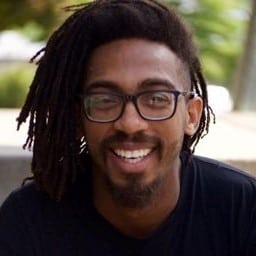You can listen to an audio version of this piece here.
 I imagine the weekend of Jesus’ execution might have felt something like the fall of 2020: the feeling of watching a revolution die.
I imagine the weekend of Jesus’ execution might have felt something like the fall of 2020: the feeling of watching a revolution die.
That fall, the revolutionary zeal of the global Black Lives Matter uprisings was answered by the Trump Administration picking activists off the streets in unmarked vehicles, clearing antiracist protesters from the White House with tear gas so the former president could pose at “The Church of Presidents” with a Bible, and an attempt to steal that year’s election in the name of white supremacy.
By that fall, support for the Black Lives Matter movement plummeted from its height of 67 percent in June, just after the murder of George Floyd, to just 29 percent. “The …decline in support for the Black Lives Matter movement is particularly notable among White and Hispanic adults,” reported Pew Research Center.
But I remember what those numbers looked like in protest on the streets of Los Angeles: speaking to crowds of hundreds of people about the power of collective action, thousands of people chanting Breonna Taylor’s name as we marched downtown, and blocking traffic in Pasadena with displays of Black joy. I remember feeling—as many freedom fighters have before me—as though liberation was just within our grasp.
I hear echoes of that feeling when I think of the two disciples talking on the road to Emmaus. “We had hoped that he was the one who was going to redeem Israel,” they say after recounting the events surrounding Jesus’ execution to a man they don’t yet know is Jesus. It’s likely that the redemption referred to in that passage has to do with liberation from Roman rule. And though this conversation obviously happens after Jesus’ resurrection, I think it gives us a glimpse of the prevailing sentiments in Jesus’ absence: disappointment, disillusionment, even despair.
Jesus’ three years of public ministry—of dignifying social outcasts and challenging institutional corruption—seemed to revive a revolutionary zeal in his compatriots. This is no more evident than in the scene of his entry into Jerusalem that Christians commemorate at the start of Holy Week. According to Matthew’s Gospel, a multitude gathered waving palm branches and chanting “Hosanna!”—which more or less translates to “Save Us, Now!”
The crowd seemed to believe, as I believed in the summer of 2020, that “this could be the moment of our liberation.” And in that salvific chant, I hear the hopeful chants of other revolutionary movements. I hear Civil Rights elders chanting “Freedom Now!” I hear anti-apartheid activists chanting “Freedom in Our Lifetime!” I hear a young Dr. King declaring, over and over, “How long? Not long!” It must have been devastating for those who lived through those moments, when their liberation from imperial oppression felt so near, to see or hear of Jesus’ execution.
I think many Christians forget about the Saturday the disciples sat with the death of Jesus, without necessarily knowing what to make of it.
Though the gospels tell us Jesus foretold his death, we can’t say the disciples knew he’d live again. We know they weren’t certain he’d walk among the living again, because none of them seemed to be expecting him on Easter morning. They surely didn’t know he was the Son of God, whatever that might mean, because Christians were still debating about that until the 5th Century Council of Ephesus. That Saturday, the disciples couldn’t be sure of anything except for the apparent absence of God.
Christians from an evangelical background like mine usually commemorate Good Friday with some kind of re-enactment of Jesus’ execution. Then we rent out stadiums for a full-blown Easter production to commemorate the resurrection that Sunday. But there are no gatherings for the Saturday in-between. We don’t commemorate the confusion, disappointment, disillusionment, and doubt of the disciples that day—probably because many of us were taught to think of these things as threats to the life of faith.
Thankfully, Christian practice is much bigger and robust than evangelicalism. Because, for centuries, some Christians have at least called that Saturday day between Good Friday and Easter “holy.” That is good news for me, because Holy Saturday is the day that I relate to most on the church calendar.
When people ask me if I am a Christian, I usually say, “It depends on what day it is.” It’s the best response I have, because it is honest. It’s the best I can do, because I’m daunted by the atrocities that have been carried out on my ancestors in Jesus’ name, as well as by the various oppressions certain Christians continue to champion today. I can’t forget the many times I’ve begged God for healings and transformations that have never come. I’m haunted by the many ways I’ve never carried Jesus’ name well: that I do the bad things I hate, and fail to do the good things I aspire to do.
What I’ve described above is not how I was trained to be a Christian. It is certainly not what some of my Christian friends want from me. They seem to want me to make a bunch of faith claims with my full chest: about the existence of God, the afterlife, the exclusivity of Jesus, and a whole host of other things. I was also given the impression that God wants me to be clear about tenets of faith as well. And I wish I could be that type of Christian sometimes (seems a heck of a lot better than cognitive dissonance and uncertainty).
But the truth is, the best I can do is acknowledge that I think I’ve experienced a connection with God through the Christian tradition, that my values have been largely shaped by the Hebrew prophets and Jesus’ teachings, and that just about everything else is a mystery. I know that is not enough for many Christians, who are strangely invested in policing how I relate to this faith, but from what I can tell, it seems to be enough for God.
On Holy Saturday, I remember that Jesus opened the kingdom of heaven to the poor in spirit. That’s me. I remember John the Baptist, sitting in prison after spending his entire adult life prophesying of Jesus’ ministry, wondering if he’d been preaching about the wrong guy—and Jesus later calling John the greatest man ever born. That’s also me. I remember that, despite Quoheleth calling everything under the sun meaningless, his book, Ecclesiastes, made it into the biblical canon. Sometimes, I feel like Quoheleth too. I remember that Jesus welcomed Thomas, a man known to us as “the doubter,” into his entourage. If I were a disciple, I’m sure he and I would have a lot to talk about.
On Holy Saturday, I’m reminded that I am in good company with the disillusioned, the doubtful, and all those of little faith. I’m reminded, at this time of year that being a disciple of Jesus is not just for those standing on the Mount of Olives, witnessing Jesus in resplendent glory and confessing, “You are the Christ,” but also for those huddled in the dark corners of Empire wondering if everything they believed was a lie.
Maybe it would do some good for some of us—the disillusioned, doubtful, and waiting—to commemorate this time of year by taking a walk with someone who can relate, like the travelers on the Emmaus Road. Perhaps, in sharing our stories and experiences, we’ll find some comfort. At the very least, we’ll find company. And who knows, we may even find the presence of Jesus again, in some unexpected way, and our hearts will burn within us.
 Andre Henry is the Program Manager of the Racial Justice Institute at Christians for Social Action and author of All the White Friends I Couldn’t Keep (Penguin Random House, 2022). He holds a Master of Arts in Theology with an emphasis in Biblical Languages from Fuller Theological Seminary and a Bachelor of Science in Practical Theology from Southeastern University.
Andre Henry is the Program Manager of the Racial Justice Institute at Christians for Social Action and author of All the White Friends I Couldn’t Keep (Penguin Random House, 2022). He holds a Master of Arts in Theology with an emphasis in Biblical Languages from Fuller Theological Seminary and a Bachelor of Science in Practical Theology from Southeastern University.


